June 2011
The Damnation of Faust closes at the Coliseum. They bought it! We pulled the wool over their eyes – it seems to have been accepted as a good thing. Foolishly, this has given me the illusion that I might be able to do another opera. I think about Berlioz again. I like him because he's crazy, flawed, exciting and he breaks rules. John Berry [ENO artistic director] mentions Benvenuto Cellini, an opera by Berlioz that has never been staged at ENO and rarely anywhere else. I prefer to do operas that haven't been done because you can't be judged against the great versions. You are page one. Plus, no one succeeds with a Berlioz opera – you might fuck it up, but so does everybody else. John also mentions that an ENO patron has offered £150,000 towards a production of Cellini.
September
Cellini is someone I've dreamed of making a film about. He was an extraordinary man: the only Renaissance character to have written an autobiography, a brilliant goldsmith and sculptor, one of the greatest of his age – and also a scoundrel and a liar. Casting his sculpture of Perseus, now in Florence, is the high point of his autobiography and of Berlioz's opera. Both are about the creative process, about madness, about hubris, about how you fuck yourself up. Berlioz, Cellini, me – it's like a magnet.
May 2012
The trick is trying to work out how you make this thing bearable to a 21st-century audience. There's wonderful story-telling music but, dramatically, you struggle to know why you should care. It's a clunky and clanky little story.
I'm eating breakfast on a plane to Los Angeles and obsessing about the overture. It lasts 10 minutes: too long for the audience to sit through waiting for the show to begin. Co-director Leah Hausman and I decide to give it a huge back story – make it an opera in itself, with sheep, hillsides, shepherds, Cellini travelling to Rome, meeting other sculptors, falling in love with Teresa ...
July
… scrap the overture idea. We got tired and figured everyone will be exhausted by the time we start. And then there's still a three-hour opera to go.
November
I put the music on my computer and start cutting. It's way too long! Berlioz was in his early 20s when he wrote this and he just threw everything in there, including the kitchen sink. So I get brutal. ENO's music director and conductor Ed Gardner and I meet. I tell him I want to cut, so it can make dramatic sense. He says: "You can't: it won't make musical sense." We make some compromises, but there are some points where he won't budge. I haven't given up.
April 2013
Katrina Lindsay is designing the costumes. We start out thinking of Max Ernst, then move away from that, but stay in the 19th century. The costumes become Victoriana: an oppressive, class-bound society in black and white. Teresa is a rich girl in a cage: when she finally gets out, the world turns upside-down and all this sex that's been suppressed rears its ugly – or beautiful – head (depending on your point of view). The carnival that ends the first act shakes everything up. It will be full of colour, freedom and chaos.
Summer
I need a translator. I set potential candidates a test. Translate Honneur aux maîtres ciseleurs, a phrase that occurs throughout the opera. Literally, it means: "Honour to the master goldsmiths." Whoever translates this best gets the job. Charles Hart, who wrote the book for The Phantom of the Opera (but I don't hold that against him) comes up with: "Laud and applaud the arts and artisans." It's perfect and it sounds beautiful: arts and artisans is very much what this is about.
Finn Ross, who worked on Faust, is doing video projections. We're going to have the whole of Cellini's foundry projected – and in the first scene, when Cellini makes his way across Rome, the world moves. I've spent the last two months working on this with Finn when I should have been doing something else that I can't tell you about because then it won't happen. I've also been making a film, The Zero Theorem. Not sure how I'm finding time for this all.
October
Disaster! Our wonderful designer Rae Smith has had to leave midway through the whole process. I take over. We'd already decided on Piranesi as an inspiration, but the set – based on his prison drawings – had become too physical and therefore too expensive. I simplify things, make the sets more graphic, more two-dimensional, and decide to use more projection.
November
I'm supposed to be promoting The Zero Theorem. Then the Pythons and I decide to do a reunion. A week later, we're at a press conference announcing it all. I'll think about the details later. I've postponed another film project, The Man Who Killed Don Quixote, until next year. It's all got too much.
Co-director Leah Hausman and I are doing a lot of thinking, listening and planning. The thing with Cellini is that the music is so bombastic. We're trying to take away the bombast and find another way of doing it. In our version, Cellini is a serial seducer and an alcoholic; the sculpture is almost secondary. Michael Spyres, who I've worked with before on Faust, has agreed to take on the lead role. "I've sung over 50 opera roles," he says, "and this is technically the most difficult. Ever." He understands madness. That's why we want him.
14 April 2014
Rehearsals begin. We've got actors only for the first week, so we can work on the carnival scene which is 30 minutes of non-stop action. Leah got the team together and is in charge. There's 100 people on stage - stilt walkers, tumblers, jugglers, magic tricks.
5 May
We have a big head problem. This is a perfect metaphor. Much of the visual stuff I'd planned isn't working – because there's a big head in the way. The head is bigger than it should be, just like Berlioz's, Cellini's and mine. This head belongs to the final Perseus statue and was designed to be in proportion, but it's ended up 30% bigger. So when it's supposed to be carried around in packing cases, it doesn't fit. Everything is wrong!
Months ago, we started working with one particular sculptor, but it was clear it wasn't right. I kept screaming: "This isn't going to work; this is the wrong person." And I kept being told: "Oh, just come down and talk." And I'd say: "No, wrong person. You can either do it or you can't." Eventually, a different sculptor started over and it was much better. But we ended up with a head that was 30% too big, and now it's too late to start again.
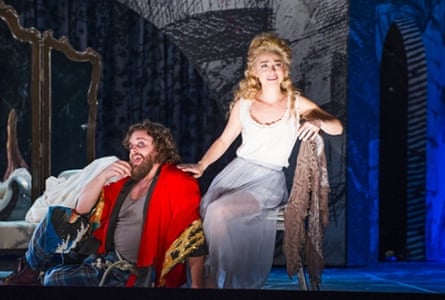
12 May
Ed Gardner's been in and out of rehearsals. We're still fighting about cuts. It depends who wears down who first. We only got 43 seconds out of Faust – we're doing a little better here. "I'm tired of arguing about this!" Ed says. I think we've worn him down. There are three versions of this opera and we're working from all three, although ours doesn't have any spoken dialogue, which was how Berlioz originally wrote it. It's hard enough making singing voices carry in the Coliseum, let alone speech, and mic-ing is horrible. But this does make it longer when we're trying desperately to keep it tight and have just the one interval.
If this were theatre, there are several cuts you'd make. At one point, we find out Cellini's going to die if he doesn't get the sculpture done. They sing: "Hung by the neck until dead/'til dead/'til dead." Boom. Then black. And CUT. Or at least, that's what you want, dramatically. But no. Berlioz then has the music go, "Dum, te-te dum, da da da-da-da da-da-da DAAAA-dum" for several more minutes. He just goes on and on – he loves his playouts. There's no way of maintaining tension; it just dribbles away. So we decide to have some fun and at least get a laugh at the end of a supposedly dark moment. But I'm not going to ruin the surprise by telling you how.
16 May
When I'm making films, I'm always right in people's faces, directing them up close. On this, and in Faust, it's Leah who does all that while I sit back and think: "This is the way real film directors work." Leah is so much better at it than me, so much more articulate. She's got more energy, she's young, and – for the time being – healthy(ish). I don't know how people do this on their own. How do they keep their eye on everything? We have three assistants and they're always busy. We could kind of do with an extra one in fact.
19 May
>We move from the rehearsal room to the Coliseum stage. Killer moment. We did a great run-through (well, hobble-through) in the rehearsal room last week and everything felt exciting and buoyant. But in the theatre today, it's a total train crash. Scene changes don't work, neither do the costume changes, and there's chaos with the chorus, who are moving like blancmange. Leah and I want to book plane tickets out of here.
20 May
Leah's been screaming for at least a year that we need more rehearsal time. The opera has a huge chorus and they're in a lot of scenes. Working with a chorus takes a long time. It doesn't move quickly: you've got a lot of bodies, a lot of minds, a lot of different things going on, and they're torn in a lot of different directions. Maybe it would be better if they all just stood at the back and sang, but it's not what's required by the music, which is telling you something's happening, there's some story going on. There are so many dramatic scenes that have to be kept alive by our singers at every single moment. But we keep having to compromise on how much we can do, due to lack of time. It's frustrating. You know how good it can be, but we have to keep trimming. Luckily, the thing is still big enough: it's still going to end up having two legs and a few other bits.
22 May
Hazel, who's doing the costumes for the Python reunion, comes to go through things between rehearsals. She's having a problem because none of us are together at the same time. Until we are, everything has to be planned in advance, and decisions are being made that may not satisfactory when the group finally get together. But I'm not really thinking about all that at the moment, not until we open.
23 May
This is ruining everything else in my life. There's no escape. Today, I've been working for the first time with lighting designer Paule Constable, so I haven't really been focusing on the big picture. Every once in a while, I look up and say: "Oh fuck, what are they doing? That's horrible! Why are you doing that?" It's like a 10-ring circus. At this stage in the process, the singers retreat back into a style they feel comfortable with, which is known as park and bark. All the work we've been doing to make this feel like a real piece of drama slips away.
Reading on mobile? Terry Gilliam talks about the production on video
26 May
Apparently, this is going to be one of the most expensive things ENO's ever done. I keep saying to John: "What about this patron? Where's that money?" An interviewer asks me how this is impacting on all my other projects. Like an impacted tooth, I tell her. If only I could just pull it out, it would be so much better.
We're struggling with the second act. Much of the story-telling falls apart here and the music itself is very distorted in places. So we've reimagined it and made the entire sequence Cellini's nightmare, with him dreaming about all of the things that can get in the way of the one thing he's got to do: cast Perseus, make that statue. I keep thinking of a Goya etching I've always liked: The Sleep of Reason Produces Monsters. In a sense, this is what we're doing. I am having trouble sleeping as I dream of real events, real people and what's coming the next day, while I struggle to get the one thing I've got to get done, done.
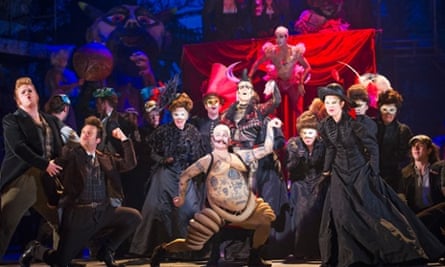
27 May
Scrap the dream sequence. We were calling it the what-the-fuck-is-going-on sequence. Nobody followed it, even as a dream sequence. The second half is weird enough as it is. We've gone back to some of Berlioz's stage directions. We'll stick with Cellini going mad, just like us.
1 June
We're in on a Sunday trying to make the overture work. We've had a really good idea for how to animate some of it, to give people a little leg-up into the story. Meanwhile, the dress rehearsal is tomorrow and we still haven't done a complete run-through. There's a fire effect we want to put in. Producer Terri-Jane Griffin was trying it out yesterday in her back garden. We're hoping to get Westminster council to come in today and give us the OK to use it.
Ed looks as green in the face as we did a month ago when contemplating all we had to do in the rehearsal room. It's such a huge piece and he has to pull together the orchestra, chorus and principal singers. We're all shitting ourselves.
2 June
The dress rehearsal and our first full run-through. The next will be opening night this Thursday. Good God! Ed took off like the clappers and the first act went like a bullet train to Tokyo. The chorus said they'd never sung anything as fast in their lives. The overture went well, but then the deputy stage manager turned over two pages instead of one. Cues were lost. For the first two minutes, nothing happened at all.
Things went on like that for some time – we watched from between our fingers – then it did sort of come together. But God, it was rough. We're thinking about making an announcement before opening night: "Things may not go smoothly. We may need to stop at some points." Still, there was an amazing energy. It's going to be really good by the third performance!
One final thing: Cellini the movie is no longer on my wish list. I've got it out of my system.
* Benvenuto Cellini is at the Coliseum, London from 5 June to 27 June. The 17 June performance will be broadcast live to cinemas around the UK and internationally. Terry Gilliam was talking to Imogen Tilden
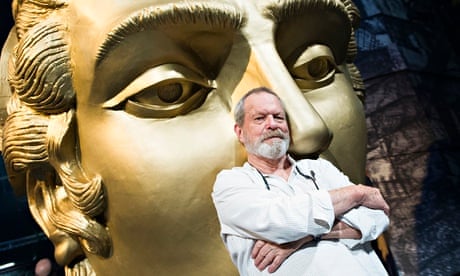

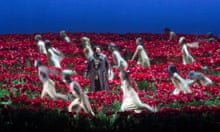
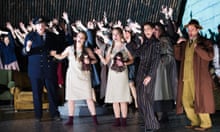
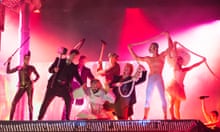

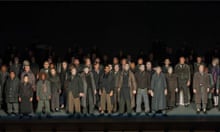
Comments (…)
Sign in or create your Guardian account to join the discussion